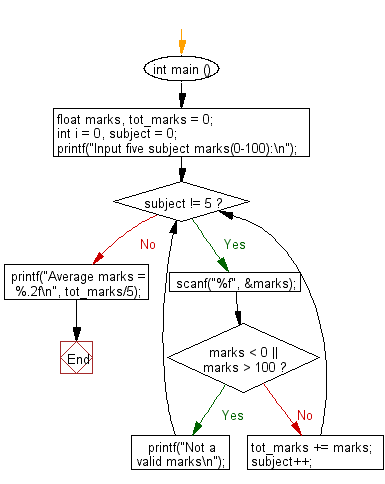C Exercises: Read five subject marks (0-100) of a student and calculate the average
C Basic Declarations and Expressions: Exercise-118 with Solution
Write a C program that reads five subject marks (0-100) of a student and calculate the average of these marks.
Sample Solution:
C Code:
#include <stdio.h>
int main () {
float marks, tot_marks = 0;
int i = 0, subject = 0;
printf("Input five subject marks(0-100):\n");
while (subject != 5)
{
scanf("%f", &marks);
if (marks < 0 || marks > 100)
{
printf("Not a valid marks\n");
}
else
{
tot_marks += marks;
subject++;
}
}
printf("Average marks = %.2f\n", tot_marks/5);
}
Sample Output:
Input five subject marks(0-100): 75 84 56 98 68 Average marks = 76.20
Flowchart:

C programming Code Editor:
Contribute your code and comments through Disqus.
Previous: Write a C program that read two integers and dividing the first number by second, print the result of this division with two digits after the decimal point and print "Division not possible..!" if the division is not possible.
Next: Write a C program to calculate the sum all numbers between two given numbers (inclusive) not divisible by 7.
What is the difficulty level of this exercise?
Test your Programming skills with w3resource's quiz.
C Programming: Tips of the Day
Static variable inside of a function in C
The scope of variable is where the variable name can be seen. Here, x is visible only inside function foo().
The lifetime of a variable is the period over which it exists. If x were defined without the keyword static, the lifetime would be from the entry into foo() to the return from foo(); so it would be re-initialized to 5 on every call.
The keyword static acts to extend the lifetime of a variable to the lifetime of the programme; e.g. initialization occurs once and once only and then the variable retains its value - whatever it has come to be - over all future calls to foo().
Ref : https://bit.ly/3fOq7XP
- New Content published on w3resource:
- HTML-CSS Practical: Exercises, Practice, Solution
- Java Regular Expression: Exercises, Practice, Solution
- Scala Programming Exercises, Practice, Solution
- Python Itertools exercises
- Python Numpy exercises
- Python GeoPy Package exercises
- Python Pandas exercises
- Python nltk exercises
- Python BeautifulSoup exercises
- Form Template
- Composer - PHP Package Manager
- PHPUnit - PHP Testing
- Laravel - PHP Framework
- Angular - JavaScript Framework
- Vue - JavaScript Framework
- Jest - JavaScript Testing Framework
